
What is the problem?
On January 20, Ukraine celebrates the Day of the Autonomous Republic of Crimea. Thirty-two years ago, on this day, the majority of Crimean residents voted in favor of establishing autonomy in the all-Crimean referendum, which determined the status of Crimea as part of Ukraine.
russia occupied Crimea in 2014. The aggressor country held a pseudo-referendum there and illegally annexed the peninsula based on its results.
During eight years of occupation, over 100,000 Crimean Tatars and Ukrainians left the Crimean peninsula. Many of those forced to leave their homes settled as close as possible to Crimea — in the Kherson region. None of them had any idea then that they would have to go through the russian occupation again.
What is the solution?
The words "Motherland," "freedom," and "dignity" sound differently in Ukrainian and Crimean Tatar. But those whom russia wants to deprive of the right to Crimea forever feel the same way. Natalia Haidai, for the sake of her freedom, fled from Crimea when it was occupied by the russians to live in the united Motherland — Ukraine. Leila Dzhaksim, whose ancestors were also deported from Crimea by the Soviet authorities, has been engaged in preserving the Crimean language in the Kherson region for the sake of the future of the Crimean Tatars.
Today's Rubryka article tells stories of two women from Kherson whose lives are closely connected with Crimea. Our heroines explain how the months passed during the occupation and what helped them to survive and not succumb to russian pressure and propaganda.
"We left Crimea because we could no longer live in a lie"
Until 2014, Natalia Haidai and her family lived in Koktebel. There, together with like-minded people, they were engaged in rehabilitating children with autism.
After the occupation of Crimea, the question arose of how to live on. At first, they thought that all this would not last long. They tried to live as before, continued classes with children, and mastered new rehabilitation methods. The realization that nothing will be like before came when Natalia and her husband noticed that russian propaganda began to launch its poisonous tentacles into the consciousness of their eldest son, a schoolboy.
"When russia came to Crimea, we were in the minority," Natalia Haidai recalls. "Only a few friends shared our opinion. Most of our acquaintances — neighbors, and parents of our children's classmates — were waiting for russia, and no matter how much we tried to convince them that it would only get worse, they did not listen to us."
The woman says that it was challenging to live amid this madness. They had to be very careful with expressing their opinions because any word against the occupiers led to aggression. At every step, the family had to watch their words and facial expressions, restrain their anger when russian flags caught their eyes, and try not to hear conversations in public transport about what a wonderful life will soon begin in Crimea as part of russia.
The family made a difficult decision to leave Crimea. At the same time, the idea arose to create a small home boarding house on the coast of the Kherson region, where families with children with autism could be invited. So, from scratch, the space for the recreation and rehabilitation of children with ASD appeared in the village of Primorske.
"russian tanks came to our house"
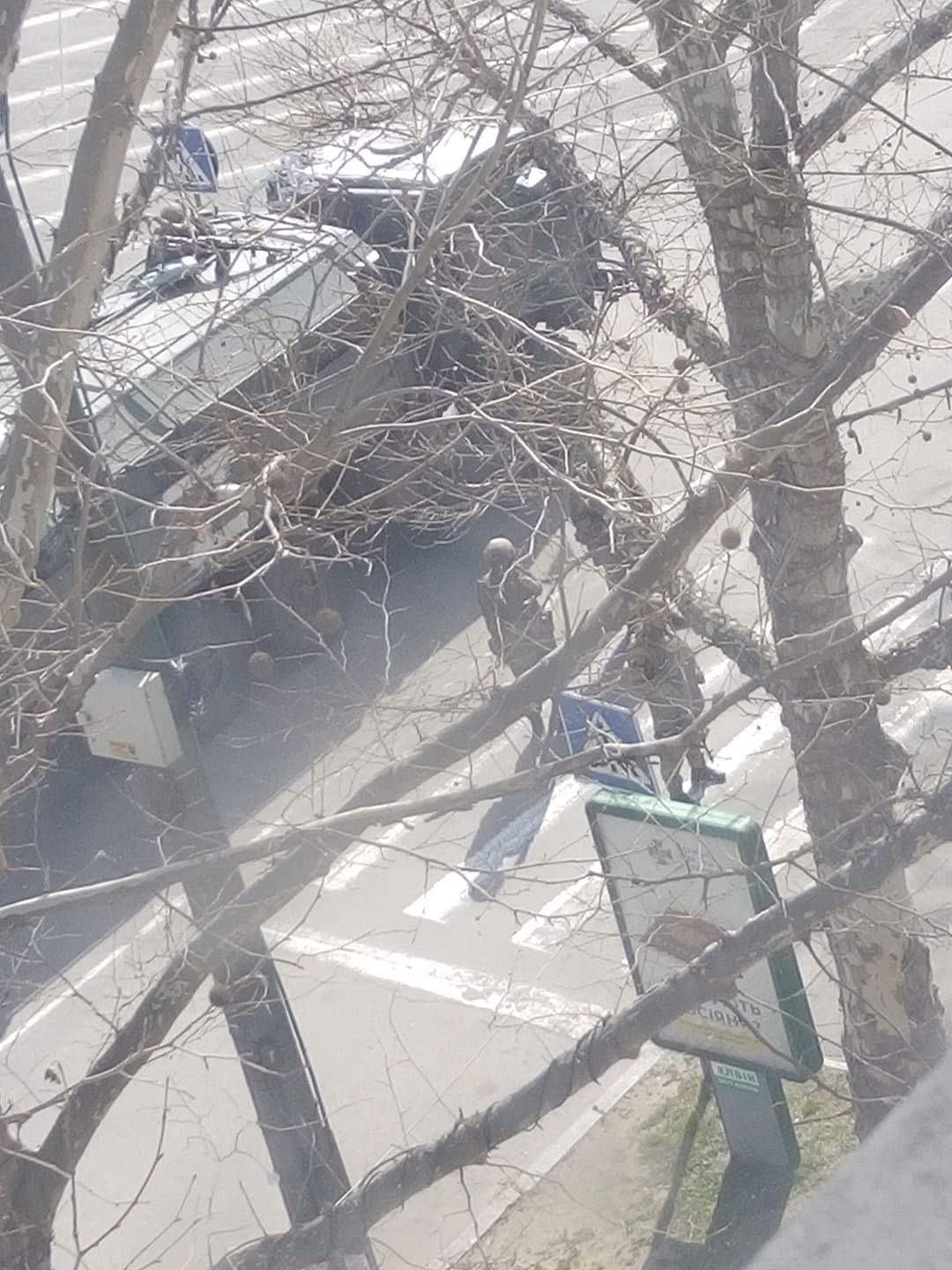
Occupiers under the windows. Photo by Natalia Haidai
The Haidai family spent the summer on the Kherson coast and returned to the city in the winter. So the family found russia's full-scale invasion in their Kherson apartment. The woman admits that if it was emotionally and psychologically unbearable in Crimea, then it became downright scary during the occupation of Kherson. On March 1, the russians began to enter Kherson from several directions after encircling the city. On the night of the same day, russian military equipment ended up in the center of the town, just under the windows of Natalia Haidai.
"At one in the morning, looking out the window, I saw russian armored personnel carriers and heard shots. And when I wrote to the Telegram bot that I saw enemy equipment, I received a reply that there might be a battle. At midnight, my children and I sat under the mattress in the corridor. I felt powerless. We heard automatic rounds and were afraid to see what was happening on the street."
Natalia and her children did not dare to leave the house for another two weeks. They saw how, day by day, people gathered more and more en masse for protests in the city's main square, and they heard how the occupiers shot at peaceful gatherings. And still, they couldn't resist — they started going to rallies themselves.
"Different things happened," says Natalia. "The occupiers threatened us, the protesters, and poisoned us with tear gas. On one of the days, I had to run away from the shots of the 'liberators' myself. It was all terrifying!"
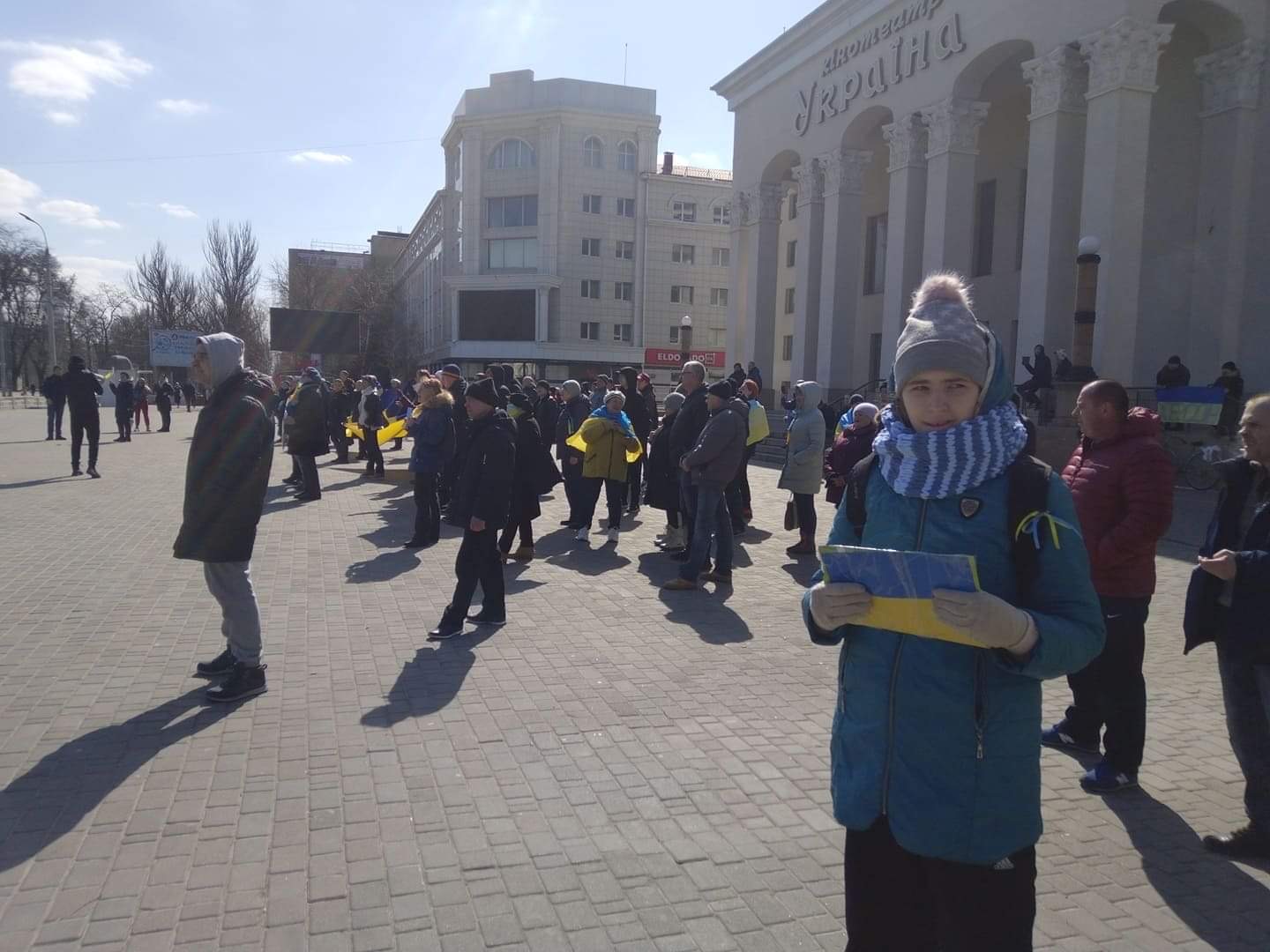
Rally in Kherson. Natalia Haidai's photo, daughter Masha is in the photo
At night, russian soldiers could be heard ransacking the office equipment and jewelry store on the first floor of Natalia's house. But the most challenging part was feeling the constant pressure from the presence of the occupiers in the city. Arriving at roadblocks or watching armed soldiers pass the line for bread. Natalia admits:
"I barely restrained myself so as not to say anything angry to them because there were many old people in the queue, and I could put everyone in danger. But several times, watching from the windows how people were being grabbed, I shouted something and then waited, fearing they would come for us too…"
The woman did not let her son out of the house because she was afraid that he would also say something to the occupiers and that he would also be taken away or killed. Once she saw that the russian military had come to the entrance of the building:
"My daughter and I were outside, and my son was at home. I was afraid they might break down the door to the apartment, so I ran home. At the apartment door, I argued with them for a long time, refused to give documents, and scolded putin and the russian authorities. I completely lost control over myself. I don't even know how and why I was like that on that day."
"I was a coiled spring"
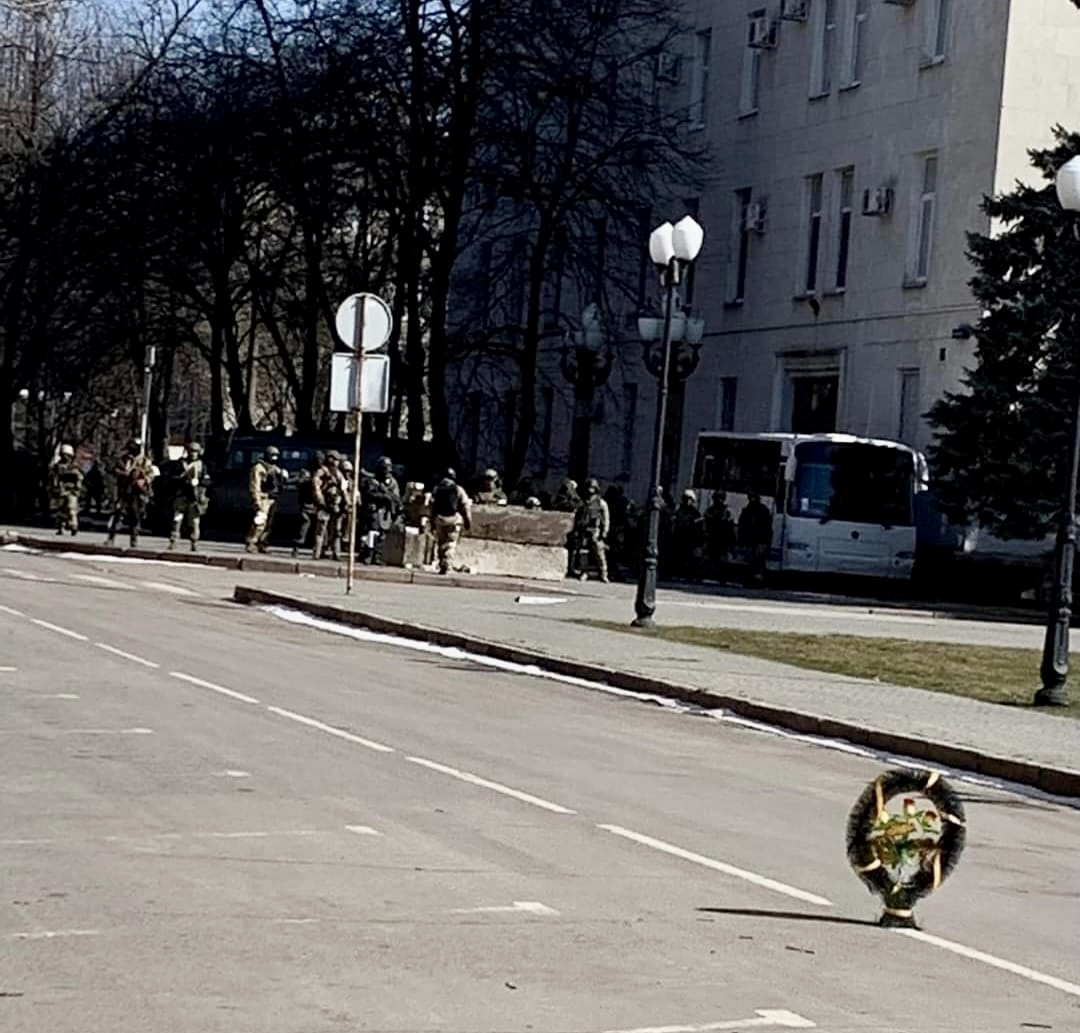
russian "liberators" were greeted with such funeral flowers in Kherson. Photo by Natalia Haidai
After this incident, the woman realized that she would no longer be able to remain invisible and began to look for ways to escape. The family waited a week for the volunteer bus. They slept dressed next to their packed backpacks. But the russians didn't allow the bus into the city. Natalia and her children were lucky: late in the evening, someone called from the UN mission with a message that there was a free seat on another bus, but they had to be at the other end of Kherson at 5 in the morning.
"We agreed. We discussed all night how we would get there and our actions if something went wrong. Walking past roadblocks in the dark during curfew was very scary. And it was even scarier to go on a bus through dozens of russian checkpoints and checks."
Natalia Haidai says when they finally reached Mykolaiv, she felt on a physical level how the spring that had been tightly compressed inside her throughout the occupation was loosening. But several months after liberation from the occupation, the woman woke up with pain in her jaws because she continued to clench them in her sleep.
"It's been nine months, and I still can't recover psychologically. I asked volunteer psychologists for help, but I understand that until this cursed war ends, I will not be able to enjoy life fully," the woman shares.
Kherson's de-occupation is the beginning to liberating Crimea
All the time while Natalia Haidai and her children were in the occupation, there was a "saving" mattress in the corridor. Every evening they heard distant explosions and hoped that Ukrainian soldiers were fighting for Kherson's liberation. Then, in the spring of 2022, they had not known that the russians would be here for ten months. But, as Natalia says, these hopes helped her and other Kherson residents not lose heart and eventually wait over for the Ukrainian Armed Forces.
"The news about the liberation of Kherson caught me in evacuation. It was so unexpected, even though we were all waiting for it. I was so sorry that I wasn't there, that I didn't meet the Ukrainian armed forces together with all the Kherson people. I immediately wanted to return. But then the shelling started. The shells flew by our apartment several times on our way to the market. And I realized that it is too early to return."
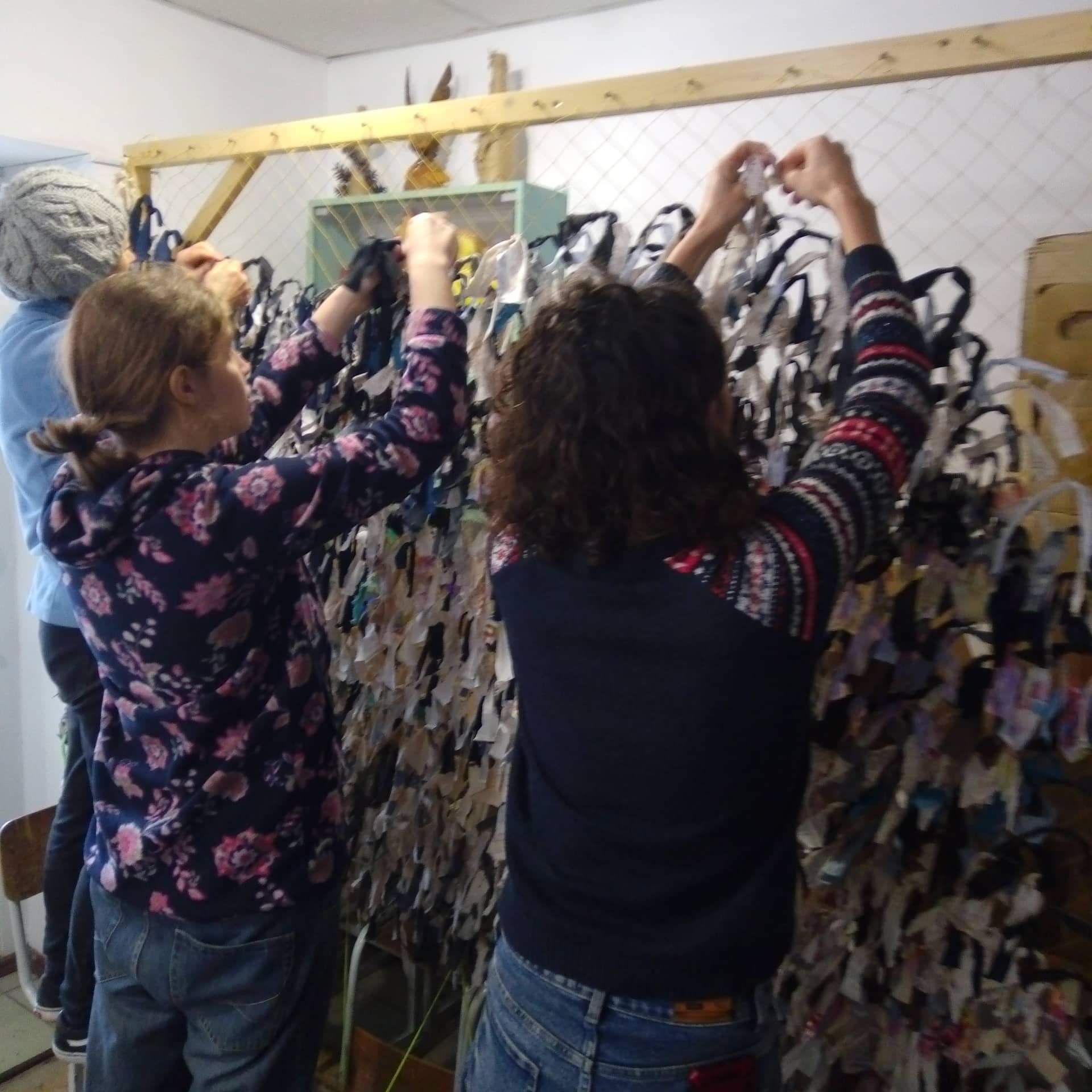
Now Natalia and her children are migrants in Ivano-Frankivsk. Together with NGO "Autism. Special Universe", they weave nets for our defenders, organize workshops for children and adults, and make postcards for the frontline. They also make patriotic bags in cooperation with the NGO Sunny Children of Kherson Region, which was evacuated to Vinnytsia.
Natalia doesn't know what is happening with the houses by the sea. Their family boarding house for children with ASD is still occupied and unattended. "A week ago, a neighbor in Primorske called and said that about 40 trucks with occupiers were staying nearby and that the russians dug up the entire beach with trenches. I believe the Ukrainian Armed Forces will also drive the russians out of there. Just like from our Ukrainian Crimea."
Occupation is like a nightmare
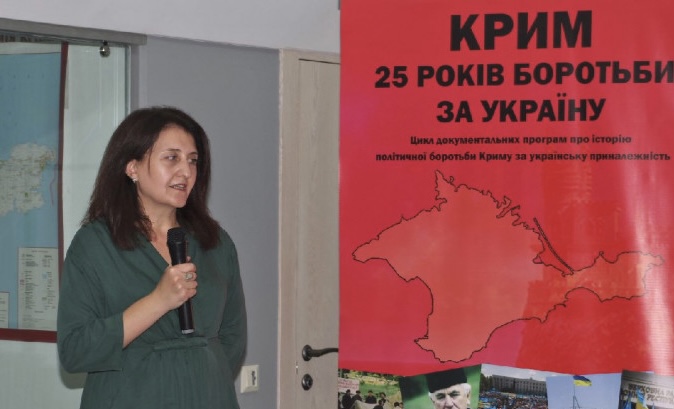
Leila Dzhaksim (pre-war photo)
Leila Dzhaksim has lived in Kherson since childhood but has Crimean roots. Her family settled here because, in Soviet times, the authorities did not allow them to return to the land of their ancestors.
Before the war, Leila headed the Kuresh Crimean Tatar Cultural and Sports Center and worked on reviving the Crimean Tatar language. Thanks to her, a Crimean Tatar language group for children was organized in the city. Even though Crimean Tatars have lived in the region for more than forty years, there have never been such courses in Kherson. On the Kuresh initiative, the club was created at one of the city's schools.
On February 24, Leila heard about the beginning of a full-scale war. In the evening of that day, it became loud in Kherson, and the next day, the tanks of the occupiers in endless columns began to cross over to the right bank of the Dnieper on the Antonivka bridge. The woman's family spent the night in the basement for a week. They couldn't believe what was happening. They avidly read Ukrainian Telegram news channels, listening to the sounds of explosions and the clatter of enemy equipment, which after a few days, was walking the streets of the city.
At the beginning of the invasion, Leila, as the chair of the board at the charity organization, was warned by her colleagues that she and her activities could attract the attention of the occupiers because the names of the Kuresh founders were on the infamous lists of the occupiers. But the woman could not leave her family. She understood that if she left, her family could be targeted. Therefore, she stayed in Kherson to avoid exposing loved ones to danger.
Leila Dzhaksim hid everything she could, and she simply burned many documents. She took computers, flash drives, historical editions, and books in Ukrainian out of the house and hid them among the neighbors.
The worst thing was to wake up every morning and expect the possible arrival of the "liberators" with a search. And there were such cases on the street where Leila's house is. It looked like this: early in the morning, two Ural trucks went down the road, and 10-20 soldiers went to the houses with "visits." They banged threateningly on the doors and windows. They answered the residents' question, "what's going on?" that it was just an inspection. It was frightening to understand how such an "inspection" could end. In the absence of information, there were many rumors and talks. People talked about "black funnels" that traveled the streets, looking for Ukrainian veterans.
Leila remembers life in the occupation as a nightmare. Almost all the time, she went in search of products. There was no work, and they lived on savings. People helped each other as best they could. People directed all available resources to cover elementary needs. Time stopped, and simultaneously, she wanted to speed it up so that this horror would end sooner. Surviving and waiting for the Armed Forces of Ukraine became the primary motivation for thousands of people in the occupied city.
"We all knew everything about everyone"
Neighbors and acquaintances agreed not to go to the illegal referendum and not to open the door to agitators.
"I'm almost sure that somewhere someone scribbled check marks for us," says Leila. "There were a lot of block managers collaborating with russians. They had lists of residents with passport data in our district. So, the occupiers probably didn't need our presence at 'polling stations.'"
"We all knew everything about everyone," says the woman. After all, in the private housing sector, everyone knows each other. Those who remained loyal to Ukraine tried not to engage with supporters of the russians. Proving something to people who succumbed to russian propaganda was useless and often dangerous.
It was especially unfortunate to hear that people who worked in education became collaborators:
"What could they teach our children if they could not pass the test in such a situation?" asks Leila Dzhaksim.
Mother tongue helped to wait over for freedom
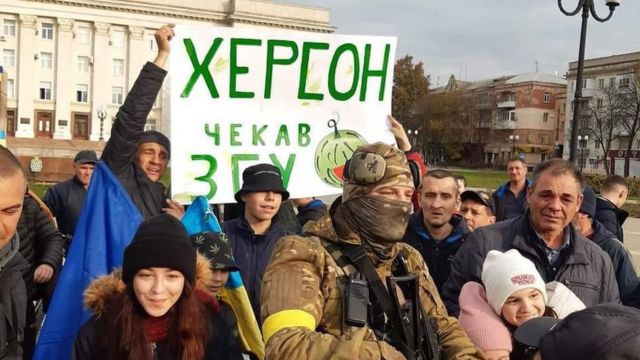
The liberation of Kherson was met with great joy:
"I never thought that the feeling of freedom could be so strong," says Leila, "as if the air itself had changed, became cleaner. It was like being able to breathe fully after a serious illness."
Leila Dzhaksim evacuated from Kherson to Odesa only at the end of November, when shelling in the city became very intense. The woman left with her children — nephews. She says that many months of stress have crippled even the young. They dream of returning home. As soon as the shelling stops, they will return immediately. As the head of the charity fund, Leila dreams of returning to public activities to continue the Kuresh educational and cultural projects, expanding them beyond the borders of Kherson.
"I don't want to say pompous things, but the main thing now is to protect people. We will grow, rebuild and restore everything else," says Leila.
During the occupation, Leila Dzhaksim was supported by books in her native language: "I didn't want to read in any other language." According to Leila, she liked the work of Cengiz Dagja, 'Olar da insan edi' ('They were people too') the most. It is about the Crimean Tatars whose village was occupied by the Red commissars. The history of the occupation of Crimea repeated itself a hundred years later.
This work of Dagja ends tragically but has another mystical moment. The heroine gives her son to her dead husband's brother with the words: let this baby become a guide, a sprout of a new life for our people. Leila Dzhaksim believes she can become such a sprout for Ukraine and Crimea, preserving the language of those who are now fighting for their freedom from the occupiers. For Ukrainians, it is Ukrainian. For Crimeans, it is Crimean Tatar:
"Language is like a child that we pass into the hands of future generations."
Newsletter
Digest of the most interesting news: just about the main thing





